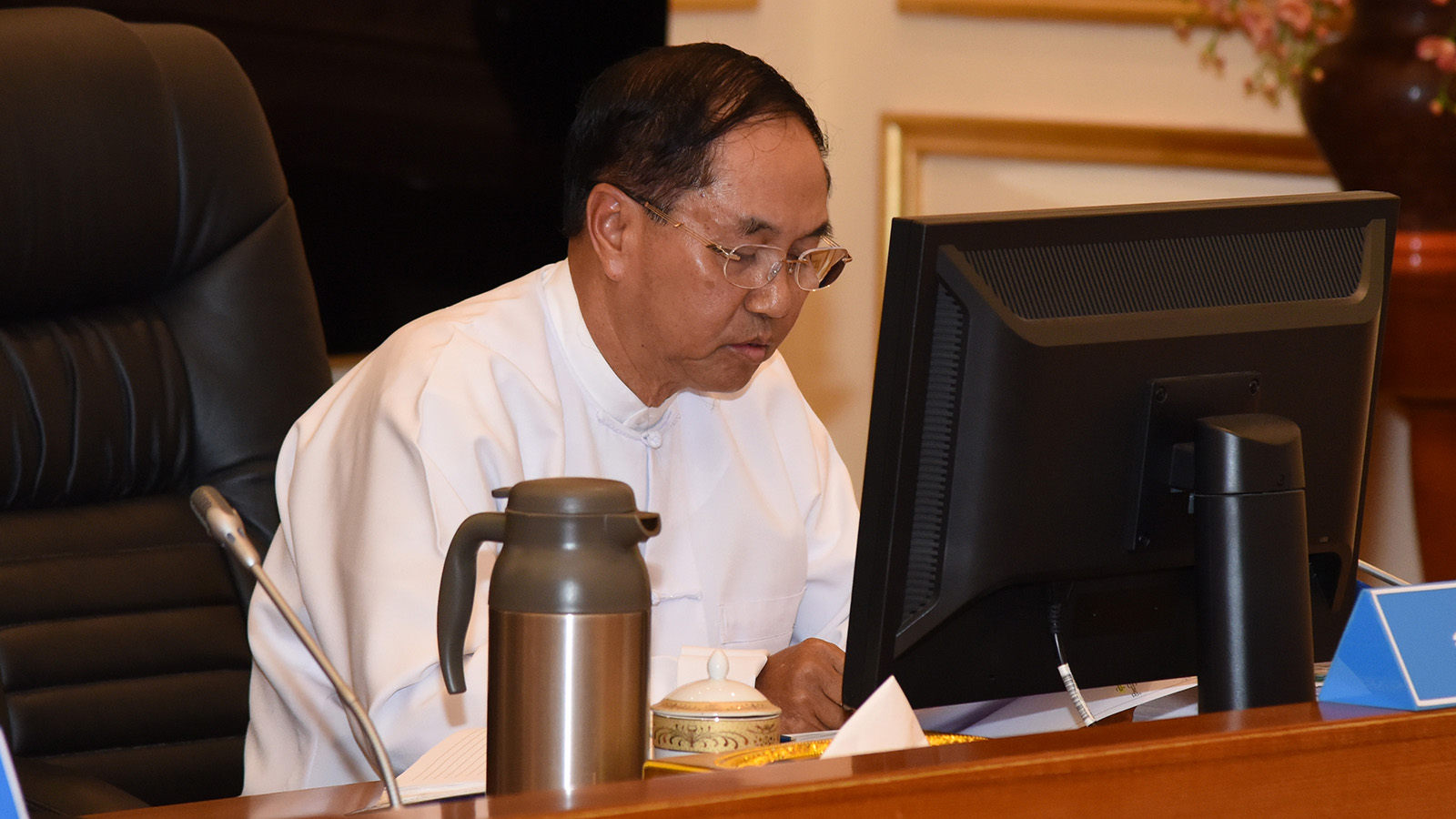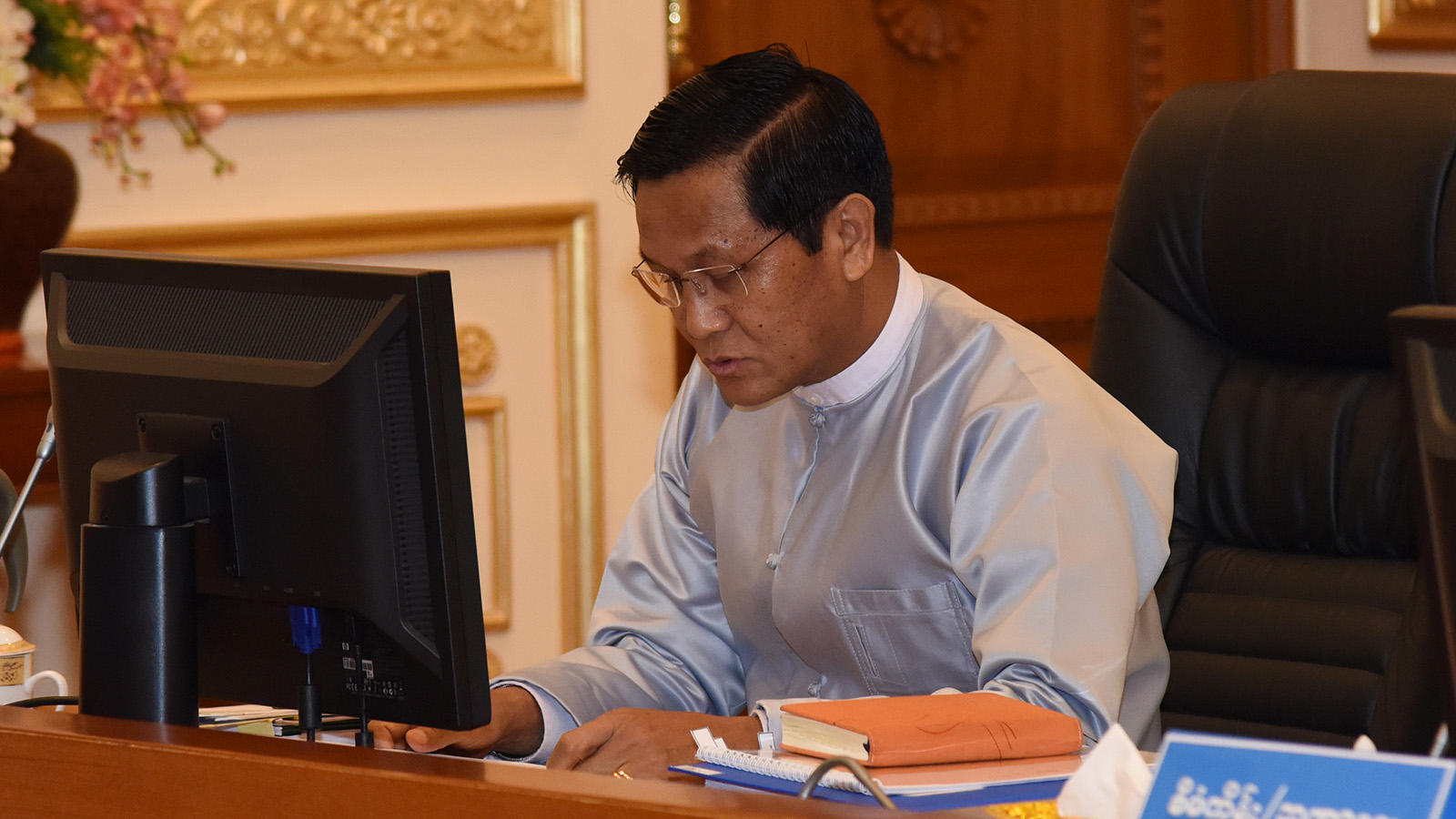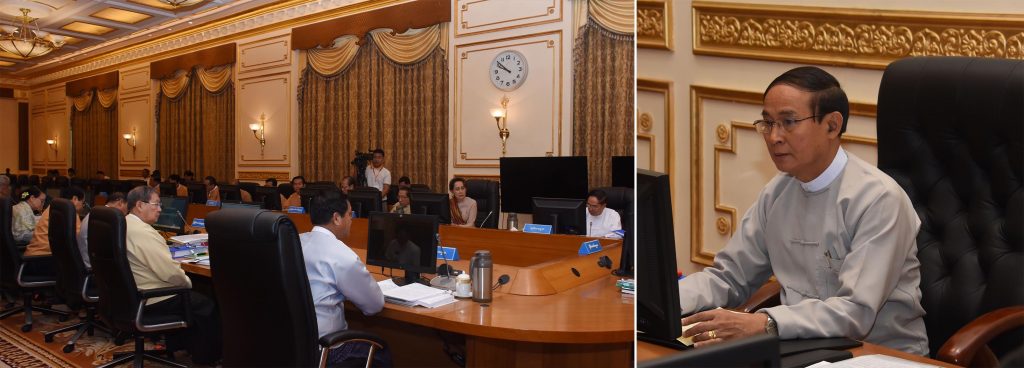President U Win Myint, Chairman of the Finance Commission, addressed the Finance Commission meeting 3/2019 held yesterday morning at the Presidential Palace in Nay Pyi Taw.
President U Win Myint said that the Finance Commission meeting was held to discuss and approve fiscal year 2019-2020 Union Budget and fiscal year 2019-2020 Union Budget Bill.
He said the Union government’s term had reached by now the fourth fiscal year and fiscal years 2016-2017, 2017-2018 and six months of 2018 have been implemented while fiscal year 2018-2019 was being implemented. The strengths and weaknesses of the past fiscal years were to be reviewed and fiscal year 2019-2020 was required to be implemented in the best possible way. Funds allocated yearly to departments and organizations were required to be effective for the country and the people. The funds must reflect the economic policies set by the State, as well as the sector wise and region wise projects and strategic projects of the Myanmar Sustainable Development Plan (MSDP).
The allocated expenses should not to be controlled by head office and works should be completed on time, and duties and responsibilities must be delegated to sub-offices with systematic expenditure management system.
Estimated expenses and actual expenses should be as close as possible. Returning too many extra funds indicates poor budget estimation capability.
A deficit to GDP ratio in excess of 5 per cent was permitted to increase the momentum of our works in fiscal year 2019-2020. Expenditures that immediately benefit the people like electrification, road and bridge works, rural development works will be increased to raise the people’s socio-economic life. On the other hand more funds would be expended on education, health and social protection works to develop the country’s human resources. Therefore, Union ministerial departments and state/region governments are asked to complete important projects that can be completed and allocated funds were to be managed and used within the financial year.
Departments and organizations responsible to obtain estimated incomes are requested to strive towards achieving them. Departments that obtained foreign assistance and loans were to draw up the actual amount that can be obtained and the foreign assistance and loans were to be used according to the time table. As loans must be returned, it was required to be used without wastage.
According to fiscal year 2019-2020 National Planning Law, total GDP increase was estimated at 7 percent. To achieve this government’s expenditure plays an important role. Benefits such as increasing production and consumption, creating employment and increasing trade can be achieved by union level and state/region level departmental organizations expending ordinary and capital expenditures allocated. In other words the Union government was increasing the economic development momentum by increasing expenditure.
The President said the fiscal year 2019-2020 budget of union ministerial departments and organizations and the fiscal year 2019-2020 Union Budget Bill that will be explained by Finance Commission Secretary Union Minister for Planning and Finance must be discussed and approved by the Finance Commission in order to send it to the Pyidaungsu Hluttaw in a timely manner.

Next, Finance Commission Vice-Chairman Vice-President U Myint Swe pointed out facts such as a deficit to GDP ratio in excess of 5 per cent permitted, changing the format of allocating emergency fund in Union Budget Law and change in financial management process of State Owned Economic Enterprises before submitting the assessment status of fiscal year 2019-2020 Union budget.
In fiscal year 2019-2020 more expenditure would be expended compared to the previous years on education, health and social protection works to develop the country’s human resources. More emphasis would be placed towards increasing expenditures that were required for the State like electrification, road and bridge works and rural development works. Union level departments and organizations were to complete the ongoing projects within the fiscal year. These projects were to be included in the national plan and implemented in connection with MSDP.

On the matter of reallocating emergency fund, instead of allocating K 100 billion to respond quickly to natural disasters and conduct relief works quickly K 50 billion would be allocated to the center while K 50 billion would be allocated to union ministerial departments and states and regions. Unforeseeable occurrence of natural disasters and matters in which expenditures must be expended are to be conducted according to work procedures.
Financial management of state-own economic enterprises (SEE) will be changed starting from fiscal year 2019-2020. SEE operating with Union Fund Account, SEE Account and Other Account is to have only UFA-SEE Account only. If the account had profit, they would have to pay income tax and all the remaining profit will have to be allocated as contribution towards the State. UFA (OA) accounts would be audited and systematically closed.
The assessed and closed fiscal year 2019-2020 budget had an income of K 25,313 billion and expenditure of K 32,340 billion. The total deficit was K 7,027 billion and deficit to GDP ratio was 5.9 per cent.
This income and expenditure included foreign assistance of K 704 billion and foreign loans of K 2,625 billion. Support from Union fund towards deficit of states and regions were K 2,114 billion and were K 320 billion more than the past year’s support.
K 350 billion would be allocated as tax share. The Pyidaungsu Hluttaw development fund would be K 32 billion, the same amount as past years. Budget drawn up and submitted by states and regions based on Union support of K 2,114 billion in fiscal year 2019-2020 budget was total income of K 1,211 billion, total expenditure of K 3,325 billion and a deficit of K 2,114 billion.
Prior to submitting state/region budget estimates to the Finance Commission the assessment of the Finance Commission was made and states and regions ordinary expenditure totaled K 995 billion and capital expenditure totaled K 2,330 billion.
In assessing the states and regions, instruction was given to prioritize expenditure on regional development and reduce expenditures on offices, guest houses, staff houses and vehicle purchases.
State and region governments had submitted that visible and priority works for the people would be conducted. The submissions were noted and would be coordinated with the Union. The state and regions were urged to ensure the timely completion of projects, reduce fund usage through change of account headings and avoid refunding huge amounts of excess funds.
The Vice President then said the budget estimate for fiscal year 2019-2020 drawn up and submitted by the states and regions were to be discussed, reviewed and approved by the Finance Commission. Afterwards Finance Commission secretary Union Minister U Soe Win explained about fiscal year 2019-2020 budget and fiscal year 2019-2020 Union Budget Bill. Finance Commission members Nay Pyi Taw Council Chairman and state/region chief ministers then discussed in support of fiscal years 2019-2020 Union Budget and fiscal year 2019-2020 Union Budget Bill.
Following the discussion, the President and Finance Commission Chairman said the day’s Finance Commission 3/2019 approved the fiscal year 2019-2020 Union Budget and fiscal year 2019-2020 Union Budget Bill and with the approval of the Finance Commission the Union Government would submit it to the Pyidaungsu Hluttaw in accordance with the law on drawing up and submitting the Union budget.
The budget submitted would be assessed by Hluttaw committees and would be discussed by Hluttaw representatives. The Joint Public Accounts Committee would submit its assessment and observation report. Similarly state/region Hluttaw budgets would be assessed according to the law by the relevant state/region Hluttaws. If Hluttaws raised questions for assessment, relevant departments and organizations were required to provide detailed, complete and solid explanations. All stages of the budget process starting from drawing up, assessment, implementation and report on implementation were to be conducted systematically and with utmost care.
Union level departments and organizations, state/region departments and organizations estimating incomes were to earmark the estimated incomes as minimum amount and strive towards obtaining more income. In the same way, allocated expenses were to be considered as the maximum expenses and strive towards completing the works while reducing the expenses as much as possible.
The President and Finance Commission Chairman spoke of the need to be transparent in budget acquisition and usage, all utilizations to be according to financial management and regulations, the need to conduct systematic audits with internal audits, systematically undertaking the inspection of the Union Auditor General and to conduct budget matters while taking full responsibilities. The following dignitaries attended the above meeting: State Counsellor Daw Aung San Suu Kyi, Finance Commission Vice-Chairmen, Vice-Presidents U Myint Swe and U Henry Van Thio, Commission Secretary Union Minister U Soe Win, Commission members the Union Attorney General U Tun Tun Oo, the Union Auditor-General U Maw Than, the Nay Pyi Taw Council Chairman, Chief Ministers from states and regions and officials.— MNA (Translated by Zaw Min)


